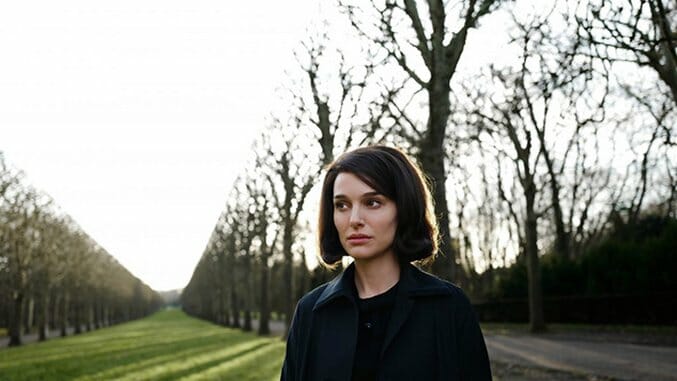Jackie

It’s difficult to remember where Jackie begins, and where it ends. Even minutes after leaving it, the moments that open the film and the moments that close it exist as diffuse notions rather than solid, plot-shrouded happenings. We understand that, barely a week after John F. Kennedy’s assassination, a conversation between Jacqueline Kennedy (Natalie Portman) and Life journalist Theodore H. White (Billy Crudup, smugly zombified) frames the film, tacks it to some semblance of spacetime—but the rest of Pablo Larraín’s biopic operates liminally. This, most of all, the Chilean director understands: If the film is about grief, then the film must act as grief acts. Unmoored and aimless, Jackie acts like a bad dream.
Threaded within the conversation between White and the recently widowed Kennedy is another narrative, that of Jackie planning her husband’s funeral despite the concerns of brother-in-law Bobby Kennedy (Peter Sarsgaard, warm and welcome) and the nascent Johnson administration, and within that narrative—or alongside it—is another, and another, and another, memories whirlpooling around and between each other, cinematographer Stéphane Fontaine’s camera often spinning besides or following close behind Jackie, always intimate, as she heads irretrievably toward some unspeakable drain, some unseen black hole. A carefully reconstructed behind-the-scenes look at CBS/NBC special A Tour of the White House with Mrs. John F. Kennedy operates inside of White’s interview, and inside that televised tour lurk the moments before the Dallas murder—in which Jackie practices her Spanish before a bathroom mirror, like both an actress reciting lines and a new wife about to meet her husband’s family—and the shock after.
Inside those vignettes wander more vignettes: Jackie trying to reconcile faith with a seemingly indifferent deity, advised by a close-talking priest (John Hurt, just kind of there); Jackie trying to pick the perfect site for her husband as she tries to pick her heels out of the mud, her and Bobby navigating rain-engorged gravesites at the Arlington National Cemetery; Jackie trying to throw her son a functional third birthday party only three days after his father’s death; and at the edge of the abyss, at the event horizon of complete submission, Jackie trying on black dresses, chainsmoking and drunkenly weaving in and out of rooms in the White House private quarters, consumed by loneliness and indecision. Jackie trying—to buttress her husband’s legacy, to stand defiantly against whatever ineffable force killed her husband, to maintain and live on and have some role in how she’s remembered, in how the myth of her White House lives on. This is how Larraín translates grief, as a series of tries. We watch Jackie try over and over to save herself from the vortex threatening to suck her forever into the moment when she lost everything.
Noah Oppenheim’s script doesn’t understand this. Instead, it’s concerned with the utilitarianism of myth-making: how it works, how it wilts, how it wields power. Much of the conflict between Jackie and the reporter, between Jackie and Bobby, between Jackie and LBJ (John Carroll Lynch), or between Jackie and the priest is in Oppenheim’s dialogue. He writes each scene as a series of negotiations: regarding the safety of the funeral procession, or the accomplishments of the Kennedy administration, or, perhaps most of all, the public image Jackie actively constructs of herself. “I never wanted fame. I just became a Kennedy,” she admits. Even a belabored musing on the musical Camelot, through which Jackie envisions her time in the White House as worthy of royal historicity, is painfully obvious, but it helps to explain how Jacqueline Bouvier became such a beloved figure long before the tragedy that iconized her. What Oppenheim totally misses is why any such myth-making actually matters.
-

-

-

-

-

-

-

-

-

-

-

-

-

-

-

-

-

-

-

-

-

-

-

-

-

-

-

-

-

-

-

-

-

-

-

-

-

-

-

-








































